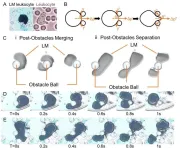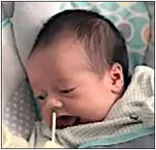(Press-News.org) New research from the University of Sydney has found people tend to discriminate in favour of individuals who show a similarity to them, even when the similarity arises from a random event like the flip of a coin.
Published in Proceedings of the National Academy of Sciences, the research runs counter to traditional theories, in particular social identity theory, that assume discrimination occurs because we divide people into groups. It finds, instead, differences between individuals are enough to trigger discrimination.
Previous research (using the seminal ‘minimal group’ experiment) showed participants tend to financially benefit members of their own group over a different group. Accordingly, influential theories argued discrimination follows from intergroup relations and social identity.
New research led by Dr Eliane Deschrijver from the University of Sydney’s School of Psychology showed discriminatory tendencies also emerged when participants are not divided into groups and interact only with a single person.
The study included seven separate experiments and analysed data from more than 1400 United Kingdom-based participants. Participants were asked to either repeatedly choose their preferred painting from two (one by Vassily Kandinsky and another by Paul Klee), estimate the number of dots presented in a ‘cloud’ of dots or take part in a coin toss.
After each choice or coin flip outcome, participants were asked to assign money to another individual. The only information participants were given about that individual was their outcome in the same scenario. Someone asked to pick between two paintings, for instance, was told which painting the person they were allocating money to preferred.
On average, participants allocated 43.1 per cent more money to another person demonstrating the same judgement or, in the case of the coin toss, the same chance outcome to their own.
“These findings can have implications for how we understand, and eventually address, discrimination,” Dr Deschrijver said.
“If humans divide resources unequally after a mere chance difference, discrimination may be more widespread and happen for different reasons than presumed at present.
“It was always thought discrimination occurs because people are assigned to groups and favour those in their own group over others. Our research demonstrates it’s possible some of our discriminatory tendencies are driven by individual processes.
“The most surprising finding was that participants would discriminate based on a coin flip. This shows us the most randomly derived dissimilarities can drive us to divide resources in unequal ways, which can be a precursor of discrimination.”
Previous research had shown people can discriminate towards an individual after a more meaningful difference, such as disagreement about one’s values or political or religious views.
The reasons why people may discriminate after a seemingly irrelevant individual difference remains subject to further research, Dr Deschrijver said.
“Because these are basic scientific results, their implications for interventions designed to prevent discrimination are highly speculative.”
Co-author Dr Richard Ramsey from ETH Zurich said the results may be linked to how the human brain responds to conflicting information.
“We know from research in cognitive neuroscience that detecting a difference often comes with a conflict signal in the brain, as well as with negative emotions,” he said.
“Detecting sameness with another person may hence lead to more positive emotions and a more favourable treatment.”
The study was conducted by researchers from the University of Sydney, Ghent University, Macquarie University and ETH Zurich.
Interviews: Dr Eliane Deschrijver | eliane.deschrijver@sydney.edu.au
Media contact: Marcus Strom | marcus.strom@sydney.edu.au | +61 474 269 459
Research
Deschrijver, E., & Ramsey, R., Unequal resource division occurs in the absence of group division and identity (Proceedings of the National Academy of Science 2025).
DOI: 10.1073/pnas.2413797122
Declaration: The researchers declare no conflicts. Funding was provided by a Discovery Early Career Researcher Award by the Australian Research Council.
END
Discrimination can arise from individual, random difference, study finds
A simple coin toss can alter the way we show favour
2025-02-13
ELSE PRESS RELEASES FROM THIS DATE:
Machine learning boosts accuracy of solar power forecasts
2025-02-13
As solar energy plays an increasing role in the global power supply, ensuring accurate forecasts of photovoltaic (PV) power generation is critical for balancing energy demand and supply. A new study published in Advances in Atmospheric Sciences explores how machine learning and statistical techniques can refine these forecasts by correcting errors in weather models.
Weather forecasts are a key input for PV power prediction models, yet they often contain systematic errors that impact accuracy. Researchers from the Institute of Statistics at the Karlsruhe Institute of Technology ...
Researchers create chemotaxic biomimetic liquid metallic leukocytes with versatile behavior
2025-02-13
Scientists led by Prof. LIU Jing from the Technical Institute of Physics and Chemistry of the Chinese Academy of Sciences (CAS) have created a leukocyte-like liquid metallic entity that vividly simulates various leukocyte behaviors in nature.
Published in Matter on February 10, the researchers demonstrated how these "liquid metallic leukocytes" can autonomously perform complex actions like engulfing foreign substances, changing shape, moving in a pulsatile manner, and even climbing against gravity—showing striking similarities to the dynamic behavior of living cells.
The research ...
Beyond DNA: How environments influence biology to make things happen
2025-02-13
RICHLAND, Wash.—Curled up inside every single one of the trillions of cells in the human body is six feet of DNA, spooled tightly and carrying the genetic instructions that govern so much of who a person becomes. It’s a nicely wrapped package of instructions for a lifetime.
But having the package in hand is a far cry from understanding how it’s executed.
It’s been 20 years since scientists completed the Human Genome Project, sequencing the entire length of DNA found in a person. Scientists have now done the same with an amazing array of organisms, including some types of worms, mice, mosquitoes, fruit flies, trees, rice and pufferfish.
Science ...
Alarming gap on girls’ sport contributes to low participation rates
2025-02-13
Researchers at Flinders University say there is an urgent need to encourage more girls to participate in sports, following a new study that reveals a striking lack of research on girls' sport engagement.
A new study in Sport in Society journal set out to review existing data on interventions to engage female adolescents in organised sport, and to explore the different factors that influence their experience and decision making in sport.
“Despite a rigorous systematic search of more than 3,000 articles, only five (globally) were found to ...
New study adds to evidence of stroke and heart attack risk with some hormonal contraceptives
2025-02-13
Certain hormonal contraceptives are associated with a higher stroke and heart attack risk, finds a large study from Denmark in The BMJ today that draws on prescription records to give more precise estimates for different products than previous studies.
The highest risk estimates were for oestrogen containing products, in particular the vaginal ring and skin patch.
The researchers stress that the absolute risk remains low, but given the widespread use of these products and the seriousness of these conditions, they say clinicians should consider these potential risks when prescribing them.
Almost 250 million women worldwide are estimated to use hormonal contraception. Previous ...
Can artificial intelligence save the Great Barrier Reef?
2025-02-13
Australian researchers are designing a global real-time monitoring system to help save the world’s coral reefs from further decline, primarily due to bleaching caused by global warming.
Coral reefs worldwide are dying at an alarming rate, with 75% of reefs experiencing bleaching-level heat stress in the past two years.
The World Heritage-listed Great Barrier Reef (GBR), considered the jewel in the crown of coral reefs worldwide and one of Australia’s most significant ecological and tourism assets, has been decimated ...
Critical thinking training can reduce belief in conspiracy theories
2025-02-13
A new study finds that training in critical thinking skills can be effective in counteracting conspiracy beliefs.
Many well-established programmes for reducing people's belief in conspiracies have either no effect or a negative effect.
The study is the first to directly compare different strategies to reduce conspiracy thinking.
A new experimental study has found that fostering critical thinking can be an effective method to reduce people's tendency to believe in conspiracy theories.
Led by researchers at University College Cork (UCC), the ...
Babies respond positively to smell of foods experienced in the womb
2025-02-13
Embargoed until 00:01 GMT on Thursday 13 February 2025
-With pictures-
Babies show positive responses to the smell of foods they were exposed to in the womb after they are born, according to a new study.
The findings, led by Durham University, UK, could have implications for understanding how healthy eating habits might be established in babies during pregnancy.
Researchers analysed the facial expressions of babies who had been repeatedly exposed to either kale or carrot in the womb after birth.
Newborns whose mothers had taken carrot powder capsules when pregnant were more likely to react favourably to the smell of carrot.
Likewise, ...
New blood-clotting disorder identified by McMaster University researchers
2025-02-12
Researchers at McMaster University have made a groundbreaking discovery in the field of hematology, providing an explanation for spontaneous and unusual blood-clotting that continues to occur despite treatment with full-dose blood thinners.
The discovery, published Feb. 12, 2025 in The New England Journal of Medicine, is expected to influence how doctors test for, and treat patients with, unusual or recurrent blood clotting, with the potential to improve patient outcomes.
Researchers found this new blood clotting disorder to have certain similarities to vaccine-induced immune thrombocytopenia and thrombosis (VITT) – a rare but aggressive clotting disorder ...
Vitamin E succinate controls tumor growth and enhances immunotherapy effects
2025-02-12
High levels of fat mass and obesity-associated protein (FTO) have been linked to increased tumor growth and resistance to immunotherapy. In a study recently published in PNAS, researchers from the University of Chicago Medicine identified vitamin E succinate (VES) as an effective agent in controlling tumor growth by promoting the degradation of FTO.
Epigenetics and epitranscriptomics play a crucial role in modifying gene expression without altering gene sequence. N6-methyladenosine (m6A) is one such mechanism, where methyl groups are added to the N6 position of adenosine on RNA. Adding these methyl groups enhances RNA stability; however, their removal by enzymes such as FTO can promote ...
LAST 30 PRESS RELEASES:
National Reactor Innovation Center opens Molten Salt Thermophysical Examination Capability at INL
International Progressive MS Alliance awards €6.9 million to three studies researching therapies to address common symptoms of progressive MS
Can your soil’s color predict its health?
Biochar nanomaterials could transform medicine, energy, and climate solutions
Turning waste into power: scientists convert discarded phone batteries and industrial lignin into high-performance sodium battery materials
PhD student maps mysterious upper atmosphere of Uranus for the first time
Idaho National Laboratory to accelerate nuclear energy deployment with NVIDIA AI through the Genesis Mission
Blood test could help guide treatment decisions in germ cell tumors
New ‘scimitar-crested’ Spinosaurus species discovered in the central Sahara
“Cyborg” pancreatic organoids can monitor the maturation of islet cells
Technique to extract concepts from AI models can help steer and monitor model outputs
Study clarifies the cancer genome in domestic cats
Crested Spinosaurus fossil was aquatic, but lived 1,000 kilometers from the Tethys Sea
MULTI-evolve: Rapid evolution of complex multi-mutant proteins
A new method to steer AI output uncovers vulnerabilities and potential improvements
Why some objects in space look like snowmen
Flickering glacial climate may have shaped early human evolution
First AHA/ACC acute pulmonary embolism guideline: prompt diagnosis and treatment are key
Could “cyborg” transplants replace pancreatic tissue damaged by diabetes?
Hearing a molecule’s solo performance
Justice after trauma? Race, red tape keep sexual assault victims from compensation
Columbia researchers awarded ARPA-H funding to speed diagnosis of lymphatic disorders
James R. Downing, MD, to step down as president and CEO of St. Jude Children’s Research Hospital in late 2026
A remote-controlled CAR-T for safer immunotherapy
UT College of Veterinary Medicine dean elected Fellow of the American Academy of Microbiology
AERA selects 34 exemplary scholars as 2026 Fellows
Similar kinases play distinct roles in the brain
New research takes first step toward advance warnings of space weather
Scientists unlock a massive new ‘color palette’ for biomedical research by synthesizing non-natural amino acids
Brain cells drive endurance gains after exercise
[Press-News.org] Discrimination can arise from individual, random difference, study findsA simple coin toss can alter the way we show favour




